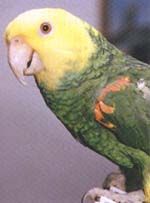![]()
![]()
| Home Page | Pet Friendly Housing | Pet Law | Archives | Contact Us | Pet Products & Services |
When Good Birds Go Bad: Biting and Screaming
By Judith Glick-Ehrenthal

In last issue's column we spoke about how to raise a well-behaved, admirable avian, whether you got them as a chick or as an adult. The flip side is when a seemingly good parrot "goes bad" and begins demonstrating "Bad Bird" behavior like "screaming" and biting. This is most often caused by a breakdown in communication between the human and the psittacine. For example, a bird may start screaming early in the morning and wake the family up, or, for no reason, starts biting hard enough to draw blood. In my experience, there is really no such thing as a bad parrot. In my opinion, "bad parrots" are just badly trained parrots exposed to people who didn't understand their bird(s) or misread their actions and responses. So-called "bad" parrots may have also been previously cared for by people who were uncaring or practiced poor bird husbandry prior to finding a good home. There is hope for these so-called "bad birds", however. Once you and your parrot are on the same wave length, there is hope for improvement with enough patience on your part. Why Are You Screaming? Any new owner needs to understand that there are certain behaviors instinctive to parrots that might cause problems. One of these behaviors is morning and evening flock calling. Birds will often call loudly in the morning and evening, especially if any flock member, including the owner, is out of sight. In captivity, if we can't provide the correct environment, both humans and birds will suffer. There are some techniques that you can try to help to overcome the screaming.
Taking the Bite Out of the Beak The second most common "bad" parrot behavior is the most feared: biting. There are so many possibilities as to what might cause biting, it is often very, very hard to understand what set off the biting behavior. To avoid being bit, it is important to be able to read your bird's mood correctly. If your bird is not in the mood to be picked up or played with, give it space. Otherwise, you will create some aggressive behavior in the bird, and the end result will be an injury. Changing biting behavior often takes a lot of effort. If the bird's signals are read wrong time and time again, you may end up with a bird that cannot be physically handled safely. Even then, both you and the bird can enjoy a good relationship with each other, but you can enjoy the bird only from a distance, and with a healthy respect. Perhaps in time the bird will gain or regain the trust, and come around. While bird ownership can be a delight, it is important for prospective owners to be aware that these negative behaviors may manifest themselves in any bird. In my personal opinion, if you do not have the time, patience and willingness to accept the change in your lifestyle necessary to live successfully with a feathered friend, then don't commit -- for both your sakes. If you already have a bird, and are faced with some bad bird behavior, there are resources you can turn to for help: Bird Talk Magazine often contains articles on avian behavior and suggestions on modifying your birds bad habits. There are many books now published that offer advice and theories on training your bird. Ask your veterinarian or pet shop if they can suggest titles to you. There are many bird behavior consultants who can offer help in understanding what is causing your bird's behavior, and advice on how to change that behavior. It is important to check the credentials of any consultant, since there is no licensing procedure. There are many, many websites that offer information on bird training. There are local clubs in many areas; there may be one near you, such as the Manhattan Bird Club or the Long Island Parrot Society. More experienced bird owners who are club members may be able to offer help and/or suggestions in working with your birds. All the solutions for bird behavior problems are trial and error. Just hold on to a belief that you and your parrot can learn to communicate and to read each other's signals. Life together could become dreamy!!! |
Would you like to be notified when New York Tails updates its Web site with articles about pets and issues of interest to pet owners? Click here to send us e-mail. Enter "New York Tails Updates" as the subject of the e-mail.